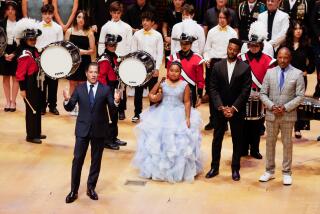Math Means More Than Monotony to These Kids : Education: Pioneer High School’s summer enrichment program makes the most dreaded of subjects fun to learn. Teachers hope it all adds up to improved confidence.
- Share via
WHITTIER — For many students on the Pioneer High School campus, this summer has not meant family vacations or summer jobs or lying around the house watching the tube. Instead, it has meant wrestling with formulas and logarithms and equations--studying what is, for many people, the most dreaded of academic subjects: mathematics.
And the kids seem to think that spending their summer with algebra and geometry was not bad at all.
“It was fun,” said Phillip Espalin, 12, an eighth-grader at Katherine Edwards Junior High School and one of about 100 junior high school students participating in the Pioneer High Summer Math Academy. “Most of the summer I never do anything anyway.”
“I liked it,” said Margarita Olson, 13, also an Edwards student. “Math has always been hard for me--until now.”
“I just wanted to get ahead,” said Amy Denny, 13, another Edwards student. “But, yeah, it was fun.”
The purpose of the math enrichment program is to give Pioneer High students and students from some of its junior high “feeder schools” an early start on math skills--the earlier the better.
The program was conceived two years ago, when Pioneer math teacher Javier Gonzalez, 29, approached Principal Pat Mascorro and said he wanted to improve the math abilities of Pioneer students, many of whom were falling behind in math skills and having difficulty with the Scholastic Aptitude Test, which most colleges require their applicants to take.
Gonzalez attended Garfield High School in East Los Angeles--a school made famous by Jaime Escalante, whose success teaching calculus to Latino students was featured in the movie “Stand and Deliver.” Although he did not study with the famous teacher, Gonzalez said he has the Escalante philosophy. “I thought if he could do it at Garfield, we could do it here.”
Gonzalez got permission to start a math enrichment program for about 280 Pioneer High students last summer. This summer, the program was expanded to bring in about 100 junior high students from two area school districts. Based on the theory that it’s never too early to start cramming young heads with math, next summer the program will recruit sixth-graders.
So far, school administrators say, almost 90% of the students who have taken the courses have moved on to higher levels of math study.
But school administrators and teachers say the math program goes far beyond mere numbers.
“We want to pump up these kids so they look at higher math as attainable,” said Mascorro, adding that the kids taking the course “run the gamut from cream of the crop to underachievers.”
“But it goes further than just the math,” he said. “Math is a glitzy subject, and the kids believe that if they can do math, they can do anything.”
Helping students do well in math, Mascorro says, has an impact not only on the children, but also on their parents.
“A lot of parents don’t have high expectations of their kids,” Mascorro said. “But if their kid starts to do well in math, a subject everybody thinks is so hard, then all of a sudden their kid is a wonder kid to them. And they start expecting more, demanding more.”
In fact, parents are involved in the program by being required to sign a contract--a concept borrowed from Escalante--promising to see that homework is completed and that the student will make a sincere effort to meet all course requirements. The kids have to sign the contract, too, and anyone who fails to meet the contract requirements is dropped from the course.
“I think (signing the contract) is a very good thing,” said Norma Camarillo of Whittier, whose two daughters, Stephanie, 13, and Tammy, 11, both participated in the program this summer. Although Camarillo admits that, like many Americans, “I hardly even know what algebra is,” she said signing the contract “shows them that you have an interest in them and their schoolwork.”
The demands of the six-week course are grueling. Students start class at 8 a.m. every weekday and break at noon for lunch. A two-hour tutorial session follows. The minimum daily homework requirement is two hours.
Isn’t that a lot of work for a 12-year-old?
“The sooner you get to them, the better,” said Pat Milhous, a math teacher at Edwards Junior High and one of the teachers in the Pioneer High summer math program. “Math is involved in 90% of the professions they’re going to want to be in. I think more and more schools are starting to realize that we’ve got to get on the bandwagon, that we’re falling behind the rest of the world” in math and sciences.
Part of the problem, Milhous says, is that American society, and American parents, have in many ways created an aura of fear around math.
“A lot of parents have made kids afraid of math,” she said--perhaps because many parents had trouble with math when they were in school. “We have to show (the students) that math isn’t scary, it’s fun.”
And how do the teachers at Pioneer High make math fun? Well, says Gonzalez, one way is to make it more like TV.
“We try to make a game out of it,” Gonzalez said. Their favorite is “Geometry Feud,” a takeoff on the popular TV game show “Family Feud.”
“You have to be creative. If they’re going to put out their summer for this, they have to have some fun doing it.”
More to Read
Sign up for Essential California
The most important California stories and recommendations in your inbox every morning.
You may occasionally receive promotional content from the Los Angeles Times.













